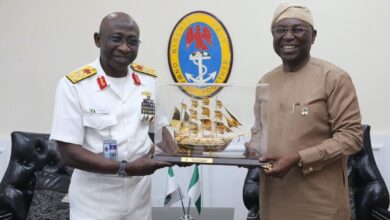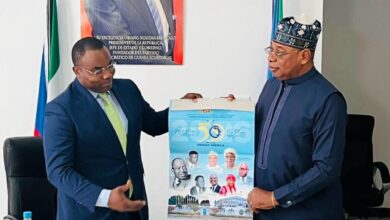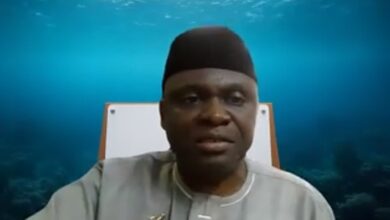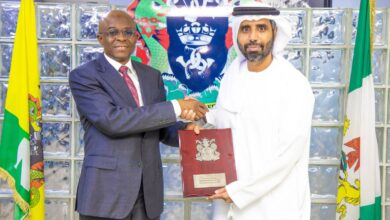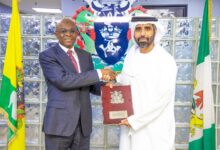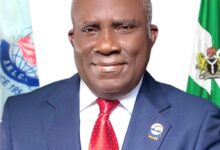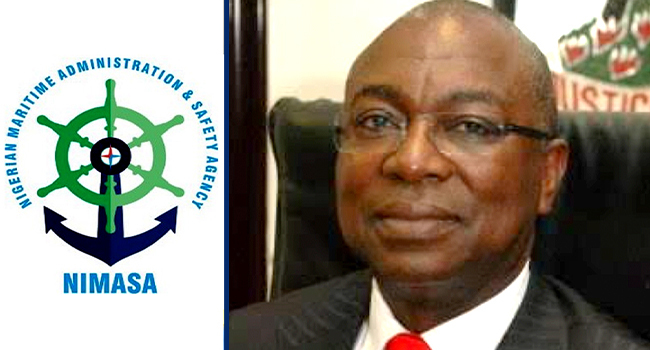
Dr. Dayo Mobereola , newly appointed Director General of Nigerian Maritime Administration and Safety Agency (NIMASA) will be expected to take charge with sleeves rolled up to address ten identified areas of importance.
1. NSDP
Initiated in 2008 NIMASA started the Nigerian Seafarers Development Programme (NSDP) with the sole mandate of training Nigerian youths to become seafarers and naval architects in fulfilling one of its cores in the area of maritime capacity building.
Sixteen years and still counting, the programme has made good success and is encountrring challenges on many fronts necessitating calls that it ought to have wound down because government is unable to sustain it
Beneficiaries of the training should by now be mobilized for train the trainers sessions to offer world class training to Nigerians locally. For alleged prolonged training sessions, some of the cadets protested in March 2024 in Lagos
The cadets accused the agency of dragging their training, which should be for four years, to more than twelve years.
“We are here to protest peacefully and demand to know why a four-year programme has turned to 12 years,” one of the protesters said. Many of the protesters said they have been unable to do anything meaningful with their lives since NIMASA has refused to pay for their training to acquire their certificates of competency.
2. MAN Oron and other MTIs
Whereas NIMASA is statutorily obliged to remit five percent of its collection to Maritime Academy of Nigeria, Oron, the agency is expected to do more for the foremost maritime training institution in the country.
The agency has in recent times supported universities by donating buildings and other facilities, it is important government and privately owned maritime training institutions (MTIs) get some support to strengthen Nigeria’s drive towards a verile and sustainable blue economy
3. CVFF
There have been a lot of back and forth on the planned disbursement of the over $350m accrued under the Cabotage Vessel Finance Fund.
Midway after former president Muhammadu Buhari approved the release of the funds, a former transportation minister, Rotimi Amaechi announced the cancellation of the hitherto given approval.
Attempts by Muazu Jaji Sambo, another transport minister, to achieve the release failed. This is one area Dr. Mobereola should look into
4. Floating Dock
The NIMASA floating dock procured under the Goodluck Jonathan administration has not lived up to expectation as it was expected to handle up to 10,000 Metric tons vessels and would be run on a Public Private Partnership arrangement.
It is looked upon as one area that will enhance Nigeria’s capacity for vessel repairs and maintenance while also raising NIMASA’s profile for internally generated revenue
During the handover ceremony, the former Director General of NIMASA, Dr. Bashir Jamoh, said that handover of the Continental Shipyard to NIMASA marks the final lap in the quest of the Agency to deploy the modular floating Dockyard.
“The Modular Floating Dockyard is a national asset and now that all grey areas between the NPA and NIMASA have been addressed, we are very close to the deployment of the Modular Floating Dock.
“Our goal is to domicile dry-docking of vessels in the country thus saving the nation foreign exchange currently expended on dry-docking vessels outside the shores of Nigeria. The floating Dock will also provide both direct and indirect employment to Nigerians with a multiplier effect on capacity development.” He said.
“The Infrastructure Concession and Regulatory Commission, ICRC, had issued a certificate of compliance for an Outline Business Case (OBC) for the operation of the floating dock, while also describing it as bankable and sustainable.”
5.New Area Offices
There is the need to strengthen NIMASA’s presence in its zonal and area offices without causing an overlap on the functions of other agencies like the National Inland Waterways Authority (NIWA)
6. Nigeria in IMO Council
After some failed attempts to secure a category C seat on the council of International Maritime Organisation (IMO) , Nigeria did vie for a position in the council in 2023.
The country should get itself more organised before embarking on the venture to contest IMO council membership
7. Cabotage: Need for NNPC, NCDMB
The Cabotage regime which is strengthened by the Coastal and Inland Shipping Act 2003 requires inter agency collaboration between NIMASA and critical government agencies like the Nigerian National Petroleum Company Ltd and Nigeria Content Development and Monitoring Board.
The objective of the Cabotage Act is primarily to reserve the commercial transportation of goods and services within Nigerian coastal and inland waters to vessels flying the Nigerian flag and owned by persons of Nigerian citizenship. Not much has been achieved in this direction.
8. Sustaining the Deep Blue Project
Under the deep blue project NIMASA set up a Command, Control, Communication, Computer, and Intelligence Centre (C4i) for intelligence gathering and data collection. It procured 16 armoured vehicles for coastal patrol; and 600 specially trained troops for interdiction, known as Maritime Security Unit.
The sea assets include two Special Mission Vessels and 17 Fast Interceptor Boats. The air assets comprise two Special Mission Aircraft for surveillance of the country’s Exclusive Economic Zone (EEZ); three Special Mission Helicopters for search and rescue operations; and four Unmanned Aerial Vehicles.
More assets have been bought under the Project, which was initiated by the Federal Ministry of Transportation and Federal Ministry of Defence, is being implemented by NIMASA.
These assets requires funding for their maintenance efficient usage
The main objective of the Deep Blue Project is to secure Nigerian waters up to the Gulf of Guinea. The Project has three categories of platforms to tackle maritime security on land, sea, and air.
9. Fastracking Issuance of SID and Biometric ID for Dockworkers
For maritime labour relationship, the leader of Maritime Workers Union of Nigeria, Comrade Adewale Adeyanju has urged Dr. Mobereola to build on the existing cordial NIMASA /labour relationship .
According to him, the ongoing issuance of Biometric Identity cards for dockworkers and printing of discharge booklets for seafarers should be done faster, leaving no qualified worker begind
10. Building Wider NIMASA, stakeholders relationship
NIMASA has robust relationship with various stakeholders. Dr. Mobereola is expected to sustain and improve on it






